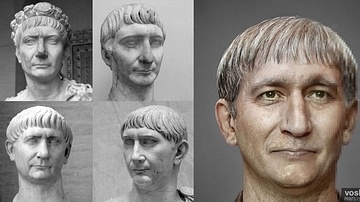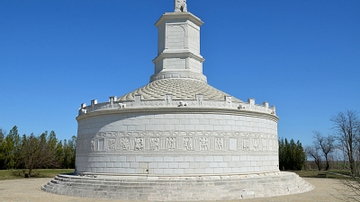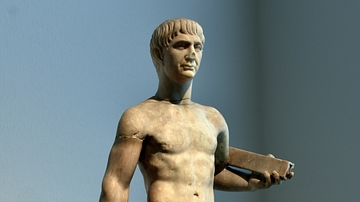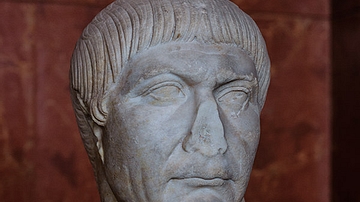Search
Did you mean: Trajan's Column?
Search Results

Image
Fountain of Trajan, Ephesus
Built around 104 CE, the fountain of Trajan is one of the finest monuments in Ephesus. It was constructed in honor of Roman Emperor Trajan. The pool of the fountain was 20×10 meters, surrounded by columns and statues. These statues were of...

Image
Trajan (Artistic Facial Reconstruction)
A photorealistic representation of what the Roman emperor Trajan (r. 98-117 CE) may have looked like. Based on contemporary and near contemporary descriptions, as well as archaeological evidence. Pictured alongside the reconstruction are...

Image
Silver Denarius of Trajan (Obverse Side)
A silver denarius showing the face of Roman emperor Trajan (r. 98-117 CE)

Image
Silver Denarius of Trajan (Reverse Side)
A silver denarius with Trajan (r. 98-117 CE) on the obverse side. Here on the reverse side, the inscriptions demonstrate the major achievements of the emperor. They read as such: PM-TRP-COSVI-PP-SPQR. These are abbreviations for Pontifex...

Image
Tropaeum Traiani (Trajan’s Trophy)
The Tropaeum Traiani is a triumphal monument built in 109 CE in then Moesia Inferior (present-day Romania) to commemorate Trajan’s victory over the Dacians in 102 CE, in the Battle of Tapae. By the 20th century CE, the monument was reduced...

Image
Trajan Statue, London
Roman emperor Trajan (96-117 CE), near Tower Hill, London

Image
Statuette of Trajan
The head and torso of this statuette did not originally go together. The head is a portrait of the Roman Emperor Trajan (r. 98-117 CE). Records of the sculpture, first presumed to be a gladiator, can be traced back to the Venetian Andrea...

Image
Trajan Bust, Louvre
Marble bust of Roman Emperor Trajan, 112-115 CE. (Musée du Louvre, Paris)

Definition
Roman Architecture
Roman architecture continued the legacy left by Greek architects and the established architectural orders, especially the Corinthian. The Romans were also innovators and they combined new construction techniques and materials with creative...

Image
Arch of Trajan in Timgad
The so-called Arch of Trajan of Timgad was actually built during the reign of Septimius Severus (r. 193-211 CE). The structure is a three-vaulted triumphal arch built at the west end of the decumanus (the east-west oriented road of the town...